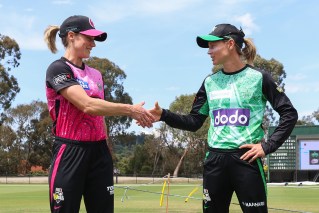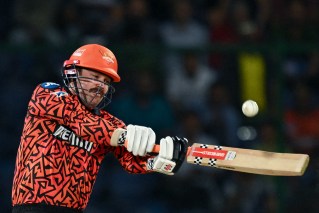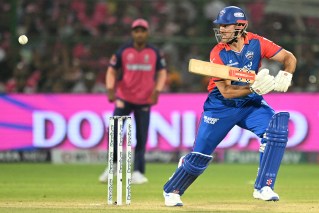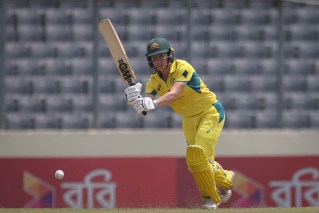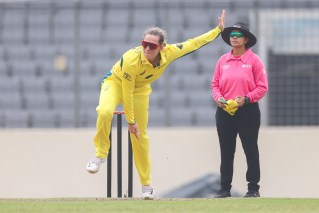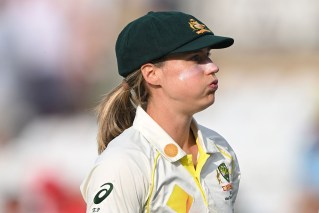What we learned: Brisbane Ashes post-mortem

• Ashes bad blood spills over as Aussies take 1-0 lead
This was surely one of the most extraordinary Test matches played in recent years.
Not, obviously, for the closeness of the result, nor for the twists and turns in the plot. Australia gained the ascendancy from midway through the second day and retained it thereafter, winning by a thumping 381-run margin.
Yet this match was played with a raw intensity that elevated it well above the ordinary. The performances of some players who rose to the occasion verged on greatness; others were cruelly exposed in the harsh light of the Gabba and hereafter will be seeking redemption. The scene has been set for one of the great Ashes series, in which only the most robust will survive.
Mitchell Johnson: an all-round performance for the ages
The pre-Ashes hype surrounding Mitchell Johnson seemed over the top, especially to those who recalled similar predictions about the likes of Shaun Tait and James Pattinson sticking it up the Poms.
Yet Mitchell Johnson lived up to every word. His match figures of 9-103 and 103 for once out were worthy of Keith Miller or Alan Davidson in their pomp.
Johnson is already 32 and has played a lot of indifferent cricket for his country, so his overall career will never be mentioned in the same breath as Miller or Davidson.
But he has taken 214 Test wickets and, if he helps deliver the Ashes back to Australia, his career will have a meaningful legacy and a fickle public will quickly forgive his previous inconsistency.
The great pity for Johnson has been that he was too often expected to lead the attack, which was not his game. If the reliable pair of Harris and Siddle stay fit, Clarke will continue to have the luxury of using Johnson in short, sharp spells as a shock trooper, the role to which he is best suited.
The ghosts of 1974-75
Not unreasonably, in light of Johnson’s rampaging performance, the Channel Nine crew have been banging on about Lillee and Thommo and sandshoe crushers and the like. It has given them a good excuse to bring out footage of men trying to protect themselves with little more than a bat and a terry-towelling hat.
Fair enough. Johnson’s bowling was of the sort not seen in Ashes combat since that celebrated series almost 40 years ago. When he bowled at the tail, with two short legs in, it looked more like a turkey shoot than a Test match. Not long ago, it would have had cricket purists feeling extremely squeamish.
When the West Indies were doing it from both ends against Australia a few decades ago, there were calls for the legislators to step in. But given that it was the Poms on the receiving end, and Australia has been so downtrodden of late, no one seemed bothered.
The closest Australia has come to creating that sort of mayhem in recent years has been isolated spells from Johnson in Perth (against South Africa and England) and, memorably, in Johannesburg. The big question is: can the new, mature Mitchell Johnson keep it up for a whole series or is this another flash in the pan?
Michael Clarke’s big statement
Clarke’s vulnerability against the short ball is no secret. Alastair Cook turns immediately to Stuart Broad when Clarke arrives at the crease. It worked in the first innings and Clarke looked at the crossroads.
In the second innings, Cook’s treatment of Clarke verged on the contemptuous, conceding singles so that the Australian captain would be on strike against Broad.
For some, it was reminiscent – although not exactly equivalent to – Kim Hughes trying to protect Graham Yallop from having to face a rampaging Bob Willis in 1981.
In short, Clarke’s reputation was on the line and he needed to make a statement. He did. His back foot counter-attack against Broad was courageous and sublime. It rubbed English noses in their own tactics.
Make no mistake. Another Clarke failure to a Broad steepler could have proved a decisive moment in this series and in his career.
Of course, for some, whatever Clarke does will never be enough. Wherever you go in club cricket land, there are supposedly knowledgeable cricket people who do not rate him. They are blind. This was one of his finest moments.
Australia’s batting is still dodgy
Australia has just won by a whopping 381 runs, one of its biggest ever Test margins, but the truth remains that it has only one — ONE — substantial Test batsman.
That is a remarkable state of affairs for a side hoping to regain the Ashes from a powerful and experienced England batting line-up.
As has been noted in this column previously, the most likely candidate to join Michael Clarke in the ranks of world-class Test batsmen is David Warner, who played superbly in this Test.
The dickhead factor has long obscured the fact that Warner is a technically accomplished batsman capable of playing with a subtlety that his mouth will never match.
His four Test centuries have included blistering performances against India and South Africa, carrying his bat in difficult circumstances against New Zealand and, now, something in between those two extremes against England. It should be remembered that Clarke outscored him during their Gabba partnership. Mind you, the six down the ground off Broad was something to behold.
Of the rest, Chris Rogers is a necessary stop-gap, Shane Watson is lucky to still be playing at Test level, Steve Smith shows promise and George Bailey has been selected on hope rather than hard evidence. Hardly a recipe for success.
These teams really do not like one another
Jonathan Agnew, not prone to hyperbole, made this point on Friday. It was evident for all to see on Sunday as the umpires had to step in between Jimmy Anderson and the rabid Australian fielders.
As Agnew observed, this was like the sixth Test in a 10-Test series. There has been no time for enmities to fade. Australia’s sustained lack of success ensures it will play with a hard edge. Think of the revenge exacted by the West Indies after they took a pasting from Australia in 1975-76. Or Allan Border’s Australians when they arrived to ridicule in England in 1989.
The twitter generation is inflaming matters. Warner’s ungracious and public sledging of Jonathan Trott – essentially accusing him of cowardice for stepping away from Mitchell Johnson – was an extraordinary assault on a fellow professional’s character, the likes of which it is hard to recall. He has put the acid not only on Trott, but on himself.
Watch for serious unpleasantness before the summer is out. And if the umpires are as hopeless at dealing with fraying tempers as they are with cynical time wasting, then we could be in for some strife.
Watch England fight back
This is a high class, well drilled and well performed England side. It will be fascinating to see how it fights back from this humiliation.
Trott, who flayed Australian bowlers last time he was here, is now in a similar position to Clarke after the first innings. He, too, needs to make a statement.
Graeme Swann, a formidable bowler and competitor, was attacked by the Australians in a manner to which he is unaccustomed. Nathan Lyon looked the best spinner in this match. Swann, too, needs to respond in Adelaide.
Anderson is proud cricketer and brilliant practitioner of his craft. Cook, Pietersen and Bell have plenty of runs left in them.
Standby.

